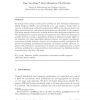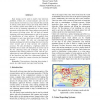1729 search results - page 277 / 346 » Simplifying the Development of Intelligent Agents |
GECCO
2007
Springer
14 years 4 months ago
2007
Springer
Imagine a group of cooperating agents attempting to allocate tasks amongst themselves without knowledge of their own capabilities. Over time, they develop a belief of their own sk...
IAT
2006
IEEE
14 years 4 months ago
2006
IEEE
Combinatorial Auctions (CAs), where users bid on combination of items, have emerged as a useful tool for resource allocation in distributed systems. However, two main difficulties...
IAT
2006
IEEE
14 years 4 months ago
2006
IEEE
To manage load on large and dynamic networks we have developed Autonomous Mobile Programs (AMPs) that periodically use a cost model to decide where to execute. A disadvantage of d...
IAT
2006
IEEE
14 years 4 months ago
2006
IEEE
Data mining can be used to model crime detection problems. Crimes are a social nuisance and cost our society dearly in several ways. Any research that can help in solving crimes f...
ATAL
2004
Springer
14 years 3 months ago
2004
Springer
Multi-agent research often borrows from biology, where remarkable examples of collective intelligence may be found. One interesting example is ant colonies’ use of pheromones as...


